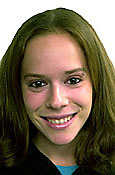 |
|
Jennifer Kursman
Columnist
|
|
|
By Jennifer Kursman
Arizona Daily Wildcat
Friday, April 2, 2004
Print this
While researching a paper about the relationship of scientific research and industry last weekend, I came across a quote that keeps echoing in my head: "The search for truth also implies a duty; one must not conceal any part of what one has recognized to be true."
Condoleezza Rice initially spoke to the Sept. 11 commission behind closed doors, refusing to testify under oath. Yet she had no problem disseminating her views to a cornucopia of media sources. She said Sunday, "There is an important principle involved here: It is a long-standing principle that sitting national security advisers do not testify before the Congress."
You have got to be kidding me.
It's true that some information Rice may know about Sept. 11, 2001, may present a threat to national security, as the Bush administration claims. But it's more dangerous to withhold information that will help our government determine exactly what went wrong. Without testimonies under oath - under penalty of perjury - how could the Sept. 11 commission piece together a clear picture of what went wrong? Every bit of information that's gathered will help us learn from our mistakes. How can we avoid repeating history without all the facts?
Rice claimed that if she testified under oath, she would be violating the separation of the U.S. branches of government. But Rice failed to recognize a far more important power: the power of checks and balances. Crying "executive privilege" hasn't worked in the past, and it certainly won't work now.
 |
|
Every bit of information that's gathered will help us learn from our mistakes. How can we avoid repeating history without all the facts?
|
 |
She wants to talk precedent? Let's talk precedent.
According to Congressional Research Service reports, an arm of the Library of Congress, post-World War II presidents have permitted "senior White House officials" to testify for congressional committees at least 20 times.
Here's a classic example: During the Watergate scandal, Nixon attempted to argue that releasing certain tapes would jeopardize national security. The Supreme Court decided whether such information was actually a threat, or simply an embarrassment to Nixon.
Again, in the case of the Pentagon Papers, the Supreme Court upheld the principle of the separation of powers. Justice Thurgood Marshall wrote in his concurring opinion, "There would be
similar damage to the basic concept of these co-equal branches of government if, when the (executive) had adequate authority ... to protect 'national security;' it can choose instead to invoke the contempt power of a court to enjoin the threatened conduct."
There's a big difference between speaking under oath and yakking on "60 Minutes." Likewise, it's important to distinguish between the release of information to the Sept. 11 commission and the release of information to the public.
The commission - not Rice - should decide if her testimony really needs to be kept private. Only in an imperial government would Rice be exempt from a check on her power.
Last week, Alberto Gonzales, White House counsel, wrote to Thomas Kean, the chairman of the investigation. The letter read, "To receive the best and most candid possible advice," it was crucial that "advisers not be compelled to testify publicly before congressional bodies such as the commission."
Have you ever heard a more ridiculous paradox? In order to have a candid discussion, it's important to withhold testimony?
Speaking the truth has been compared to lighting a candle in the dark. Yet, as Ursula K. Le Guin has said, "To light a candle is to cast a shadow." There is always more than one way to look at the same scene - but without all the puzzle pieces, it's impossible to see the big picture.
Now that Rice has abandoned her bogus "principles," the commission can finally move forward. May justice prevail.
Jennifer Kursman is a biochemistry freshman. She can be contacted at letters@wildcat.arizona.edu.

